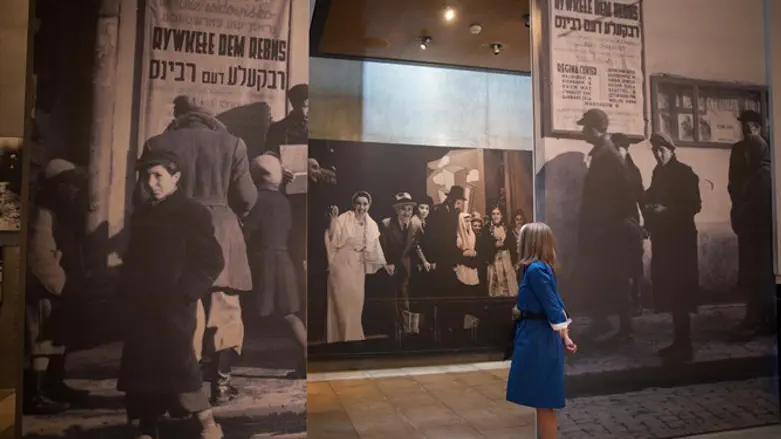
Each year we are reminded on Holocaust Remembrance Day that the number of survivors is declining every year and the burden of memory is becoming increasingly critical, but are we prepared for the day when Holocaust survivors are no longer among us?
Prof. Yaniv Poriya of Ben-Gurion University addresses the issue in an interview with Arutz Sheva, and starts by describing the sights he saw this morning, Holocaust Memorial Day, which in his view are not evidence that the memory of the Holocaust is being burned into the future:
"I saw flags being raised for Independence Day that could have waited to be put up. Had the children been in school they'd be dressed festively even though it's a day of mourning. I'd like to see at least the adults dressed in a way that symbolizes mourning. We commemorate not six million people who died but six million who were murdered just because of their Judaism. It's no reason to wear blue and white," says Prof. Poriya.
Prof. Poriya points out that he believes it appropriate to replace the term "Holocaust rescued" as is customary in Hebrew with the term "Holocaust survivors". According to him, the word "rescued" has a passive meaning while the survivor is the one who struggled and survived and is alive with us today. "The use of language, especially in state ceremonies, is critical to understanding reality. Words produce reality. Survival symbolizes action, rescue symbolizes a struggle to overcome, but many have not yet overcome," says Poriya, who hypothesizes that if we define the survivors as such we will assist and support them more than we currently do.
As for hanging the flags, we asked Professor Poriya if his interpretation is not too categorical, and if it is wrong to explain the act as a shared pride in the State of Israel that absorbed the survivors and marched with them to achievements. Is it not correct to see such flags waving in response to all those who wished to destroy the Jewish People and could not? Prof. Poriya understands this interpretation but does not accept it and estimates that hanging the flags is due to laziness and fear of doing things at the last minute. "Personally, I hang a flag only after I return from the cemetery," he said. "I can see the merit in the other direction of thought, but it's important that we have common ceremonies as a public, that we have a common denominator especially at a time when various groups are being pushed away from each other."
And what about burning the lessons into the national memory for the future? "On Holocaust Day we talk about the obligation to remember, and the generation of parents in Israel remember, but when you ask what you remember, in my estimation the family circle doesn't talk about the lessons of the Holocaust and does not remember it beyond the headline of the murder of six million. People don't bring the family to a discussion, a prayer, or a short ceremony where they talk about the lessons of the Holocaust.
"In the long run, we have to prepare for the day when there will be no survivors here. We have to prepare alternative ceremonies to suit the current generation, that's important to know how to approach them," says Prof. Poriya, offering some examples: "We should all wear black, each child should light a memorial candle, there should be a family ceremony with fixed text into which one can also pour personal ceremonies." In his remarks, he notes that the story of the Exodus is remembered because it's mentioned every Sabbath and Passover eve.
On the initiative taken by former Minister Rabbi Shai Piron for drafting a Holocaust Memorial Day hagadda, Poriya says the idea is definitely in the right direction, though it may be too long and perhaps it would be more appropriate to make it accessible to the younger generation who share the understanding that there is a responsibility to remember and perpetuate.
Is there any authority in Israel that can determine and fix such canonical text? "Unfortunately, at the moment there is no authority and the political figures are not seen as leaders or the sages of the community. However, I can see social initiatives such as Rabbi Shai Piron's, I can see the importance of Heritage Ministry involvement that will assemble a group that is acceptable to the majority of Israel and they are the ones who can create some text." To this hope, he adds a reminder that "the Passover Haggadah is also not canonical. It was originally very short, but to it were added songs and melodies and with that is its beauty. There's no problem for us to have text that will grow and change and adapt to the generation."
